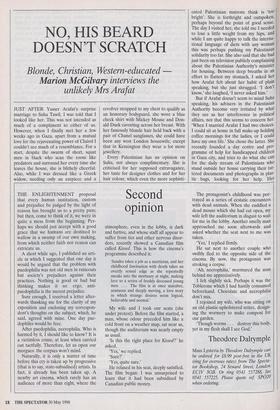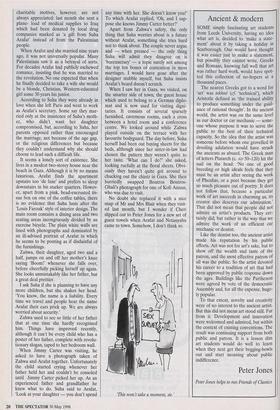NO, HIS BEARD DOESN'T SCRATCH
Blonde, Christian, Western-educated
Marion McGilvary interviews the
unlikely Mrs Arafat
JUST Al-1 ER Yasser Arafat's surprise marriage to Suha Tawil, I was told that I looked like her, This was not intended as much of a compliment to either of us. However, when I finally met her a few weeks ago in Gaza, apart from a mutual love for the rejuvenating power of Clairol I couldn't see much of a resemblance. For a start, despite the swarm of short, squat men in black who scan the room like predators and surround her every time she leaves the house, she is blithely cheerful. Also, while I was dressed like a Greek widow, needing only an earpiece and a revolver strapped to my chest to qualify as an honorary bodyguard, she wore a blue check shirt with Mickey Mouse and Don- ald Duck cavorting across her breast. With her famously blonde hair held back with a pair of Chanel sunglasses, she could have been any west London housewife, except that in Kensington they wear a lot more jewellery.
Every Palestinian has an opinion on Suha, not always complimentary. She is criticised for her supposed extravagance, her taste for designer clothes and for her hair colour, which even the more sophisti- cated Palestinian matrons think is 'too bright'. She is forthright and outspoken, perhaps beyond the point of good sense. The day I visited her, she told me I needed to lose a little weight from my hips, and while I am quite happy to talk the interna- tional language of diets with any woman this was perhaps pushing my Palestinian solidarity too far. She also said that she had just been on television publicly complaining about the Palestinian Authority's minister for housing. Between deep breaths in an effort to flatten my stomach, I asked her how Arafat felt about her habit of plain speaking, but she just shrugged. 'I don't know,' she laughed, 'I never asked him.'
But if Arafat doesn't seem to mind Suha speaking, his advisers in the Palestinian Authority become very irritated by what they see as her interference in political affairs, not that this seems to concern her. `When I married Arafat I had two choices. I could sit at home in full make-up holding coffee mornings for the ladies, or I could have my own life.' She chose the latter. She recently founded a day centre and pro- gramme of help for handicapped children in Gaza city, and tries to do what she can for the daily stream of Palestinians who stand outside her house carrying their tat- tered documents and photographs in plas- tic bags, looking for her help. Her charitable motives, however, are not always appreciated: last month she sent a plane- load of medical supplies to Iraq which had been donated by local drug companies marked as 'a gift from Suha Arafat' instead of from the Palestinian people.
When Arafat and she married nine years ago, it was not universally popular. Many Palestinians saw it as a betrayal of sorts. For decades Arafat had publicly eschewed romance, insisting that he was married to the revolution. No one expected that when he finally decided to take a wife she would be a blonde, Christian, Western-educated girl some 30 years his junior.
According to Suha they were already in love when she left Paris and went to work as Arafat's secretary. Some say they mar- ried only at the insistence of Suha's moth- er, who didn't want her daughter compromised, but, according to Suha, her parents opposed rather than encouraged the marriage, not because of the age gap, or the religious differences but because they couldn't understand why she should choose to lead such a difficult life.
It seems a lonely sort of existence. She lives in a modest two-storey house near the beach in Gaza. Although it is by no means luxurious, Arafat finds the apartment upstairs too `de luxe' and prefers to sleep downstairs in his starker quarters. Howev- er, apart from a pink, bead-encrusted tis- sue box on one of the coffee tables, there is no evidence that Suha lusts after the `Louis Farouk' style of interior design. The main room contains a dining area and two seating areas incongruously divided by an exercise bicycle. The plain white walls are lined with photographs and dominated by an ill-advised portrait of Arafat in which he seems to be pouting as if disdainful of the furnishings.
Zahwa, their daughter, aged two and a half, jumps on and off her mother's knee saying 'Boom!' whenever she falls over, before cheerfully picking herself up again. She looks unmistakably like her father, but a great deal prettier.
I ask Suha if she is planning to have any more children, but she shakes her head. `You know, the name is a liability. Every time we travel and people hear the name Arafat their ears prick up. We are always worried about security.'
Zahwa used to see so little of her father that at one time she hardly recognised him. Things have improved recently, although it can't be every child who has a poster of her father, complete with revolu- tionary slogan, taped to her bedroom wall.
When Jimmy Carter was visiting, he asked to have a photograph taken of Zahwa and Arafat together. Unfortunately the child started crying whenever her father held her and couldn't be consoled until Jimmy Carter picked her up. As an experienced father and grandfather he knew what to do. Suha said to Arafat, `Look at your daughter — you don't spend any time with her. She doesn't know you!' To which Arafat replied, 'Oh, and I sup- pose she knows Jimmy Carter better?'
Apart from Zahwa's safety, the only thing that Suha worries about is a future without Arafat, something she tries hard not to think about. The couple never argue and — when pressed — the only thing Suha will admit they disagree on is `bureaucracy' — a topic surely not among the top ten bones of contention in most marriages. I would have gone after the designer stubble myself, but Suha insists Arafat's beard doesn't scratch.
When I saw her in Gaza, we visited, on the smarter side of town, the guest house which used to belong to a German diplo- mat and is now used for visiting digni- taries. It consists of several sparsely furnished, cavernous rooms, each a cross between a hotel room and a conference centre. We looked around while Zahwa played outside on the terrace with her favourite bodyguard. The day before, Suha herself had been out buying sheets for the beds, although since her sister-in-law had chosen the pattern they weren't quite to her taste. 'What can I do?' she asked, looking ruefully at the floral sheets. Obvi- ously they haven't quite got around to chucking out the chintz in Gaza. She then hurriedly swapped Boutros Boutros- Ghali's photograph for one of Kofi Annan, who was due to visit.
No doubt she replaced it with a nice snap of Mr and Mrs Blair when they visit- ed last month, but I wonder if Cheri slipped out to Peter Jones for a new set of guest towels when Arafat and Netanyahu came to town. Somehow, I don't think so.
`This won't take a moment, sir.'



































































 Previous page
Previous page